 SPLINTERS
SPLINTERS
Tennessee Valley Woodworkers
 Vol. 16/ Issue12
December 2001
Editor: Tom Gillard Jr.
Vol. 16/ Issue12
December 2001
Editor: Tom Gillard Jr. 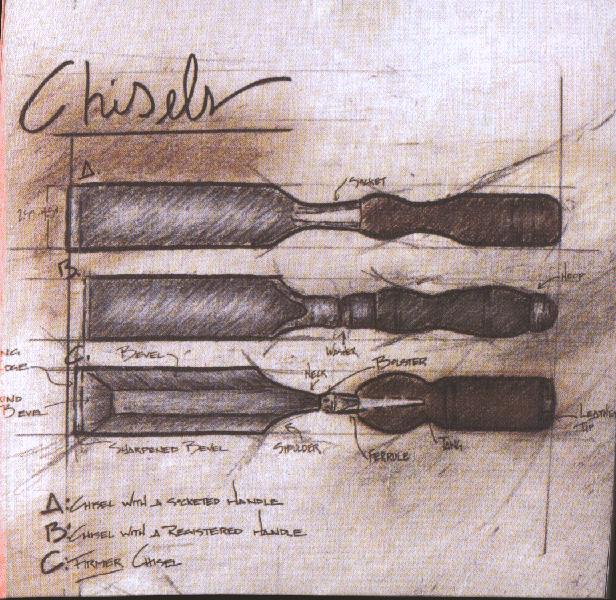

Meeting Notice:
The next meeting of the TN Valley Woodworkers
Will be held, December 18 at 7:00 p.m. in the
Duck River Electric Building, Decherd, TN
All interested woodworkers are invited!


The following people have agreed to serve as contacts for their particular
skills. If you have questions, suggestions
for activities, or other comments relating to these skills, please
call these folks. Their interest is to help the
club better serve their area of expertise. Your participation
with them will help them achieve that goal.
Alice Berry 454-3815 Design
Phil Bishop 967-4626 Finishing
Tom Church 967-4460 Turning
Harry May 962-0215
Carving
Bob Reese 728-7974 Sharpening
Ross Roepke 455-8310 Joinery
Maurice Ryan 962-1555 Health and Safety


The election results are in and here is the slate of new club officers
for 2002:
Bob Leonard -President
Doyle McConnell -Vice President
Barbara Keen- Secretary
Henry Davis -Treasurer
Ruth and Maurice Ryan -Publicity Chairmen
Congratulations to all and may we
have another fine year under new management.

The December meeting:
After much discussion with Doyle and Tom Cowan, we decided to have an extension
of Show and Tell and let each member bring samples of their early projects
and a recent project and demonstrate the difference. If members don't
have samples of early and recent, then feel free to bring what you have.
If you have a favorite tool or fixture, bring it. This will be the same
type program we had last December.
-----------------------------------------------------------------------------------------------------------------------------
Spiral Bits
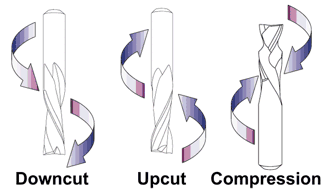
Downcut
As the name implies, the cutting action of this bit is downward, or
away from the router base. That shearing motion imparts a clean edge on
rabbets, dadoes, grooves, shallow mortises, and plunge cuts
in both sheet goods and solid stock. When cutting grooves or dadoes deeper
than the diameter of the bit, don't try to take the full depth at once.
Instead, make several progressively deeper passes. A downcut bit tends
to pack the wasted material down into a deep cut, rather than ejecting
it, and shallow cuts reduce the problem.
Upcut
This bit wasn't designed to leave a clean edge like a downcut bit,
but rather to remove the chips created in a deep plunge cut. That
makes it ideal for plowing out a deep mortise in solid stock. Tearout caused
by the upward shearing will be hidden by the tenoned workpiece.
You also can use an upcut bit in your router table for any edge
treatment that you perform with the workpiece face up, such as jointing
solid or highly figured stock. (Remember that in a router
table, the upcut bit is now cutting down.)
Upcut/downcut or compression bit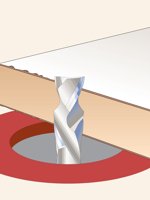
The unique geometry of this bit cuts from the top down and the bottom
up at the same time, and it's ideal for cleaning up the edges of hardwood
plywood or melamine-coated particleboard (MCP). For such easily chipped
materials, WOOD® magazine shop manager Chuck Hedlund first cuts the
pieces oversized on the tablesaw, leaving an extra 1/16" on all sides.
He then loads up a compression bit in the router table, setting the center
of the bit's cutting flutes to about the middle of the workpiece's
thickness. Finally, he offsets the outfeed fence 1/16" and joints
away the chipped edges.
-----------------------------------------------------------------------------------------------------------------------------
Tip of the Day
Know when to stop sanding
It's all too easy to sand through the thin veneer of plywood and fibercore
lumber when beltsanding a finished frame edge, whether in a cabinet
or a picture frame. Sanding frames that mount to the bottom of a few recent-model
belt sanders help,
but what if you don't own such an accessory?
TIP: Shade a wavy pencil line on the veneer edge that butts up against
the frame. Stop sanding the joint just after the pencil line disappears.
The same technique works well on banded tops and shelves.
—Terry Leach, Lovington, Ill.
Christmas Party
What a wonderful party!!! Such good food and fellowship.
Thanks to everyone that helped in the setup and clean up.
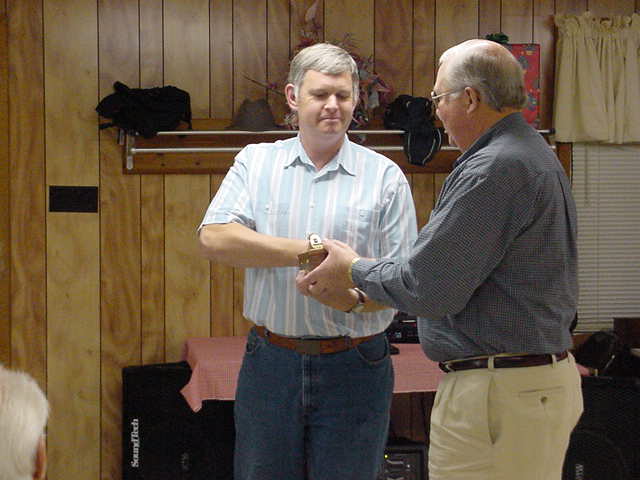
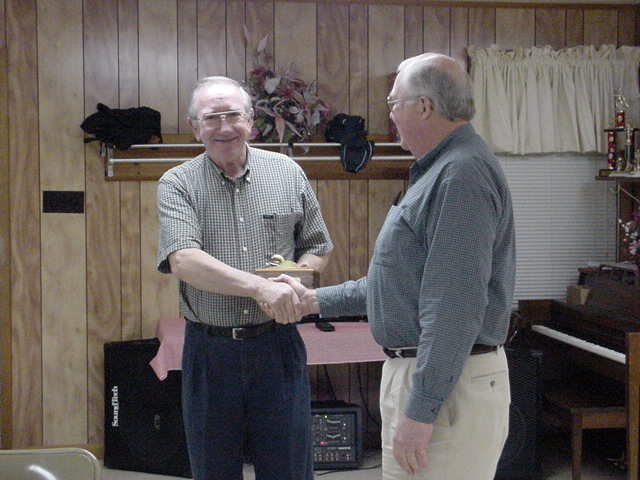
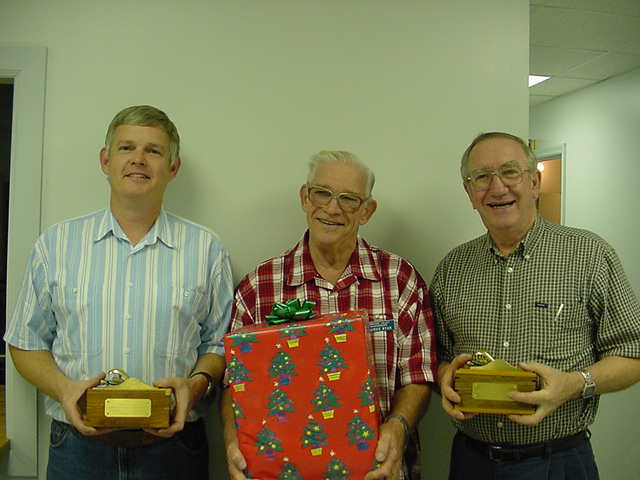
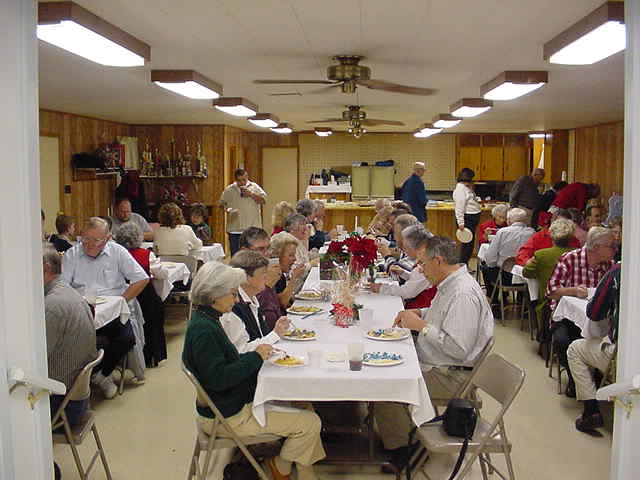
Congratulations to Maurice, the winner of the DeWalt router...
**I would like to thank the club for the wonderful gift that was presented
to me last night at the party. It was a complete surprise.
I am glad everyone enjoys the newsletter. I have hoped it would be
fun and informative, too. I will try to maintain the quality you
have come to expect.
Tom
I certainly want to thank the members of Tennessee Valley Woodworkers
for
the nice gift I was presented at the Christmas party. It
was a Lee
Nielsen plane in a commemorative box. Things like this is suppose
to happen
to someone else. Thanks again for the gift and most of all for
the thought
and allowing me to be part of such a great organization.
Doyle
November Show and Tell
Bob Reese: #14 Violin out of Birdseye maple, 2 pecan bowls
and other bowls.
Steve Shores: Black locust bowl, sassafras bowl, and Bradford
pear bowl
David White: Two frames for decorative ceramic tiles.
Bob Lowrance: Finch, bird, that he carved while attending
the John Campbell Folk Art School
Ross Roepke: Magazine rack and “traveling cross” for a
minister.
Bob Leonard: Display stand for a Christmas ornament made
by Bobby Clemons
Doyle McConnell: A sample of the rosette blocks for his
daughter’s house and the jig he used to make them. Also, a sample
of the 80 spindles he is turning.
Hugh Hurst: Maple bowl. His first!
Manual Brown: Multi-wood species pencil boxes and three
maple and exotic woods segmented bowl having an American flag motif.
Jim VanCleave: Jewelry box with spline joinery and the
jig to cut the splines.
Jim Parker: Handkerchief table with hand carved Cabriole
legs.
Aaron Schroer: Marquetry plaque with Pokemon faces
John Troxler: Marquetry jewelry box from Italy


WEB
SITES of INTEREST
WOOD
ONLINE newsletter
Arrowmont School
Falls Mill
Appalachain
Center for the Arts
Forest
Products Lab. 1999 Wood Handbook
Highland Hardware
Woodworker's
Journal
WOOD
Online TVWW page
Kevin's Woodturnings
Precision Blade and Tool



Saw Blade Sharpening Services: Branching Out is now offering their
services as a drop off spot to have your saw blades sharpened. The
blades will be picked up (Tuesdays), sharpened, and dropped back off at
Branching Out. The Leitz Tooling Systems out of Collierville, TN
will do the sharpening. Call (393-0525) or stop by for details.
Webmaster:
Tom Gillard Jr.
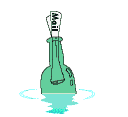
 SPLINTERS
SPLINTERS
 Vol. 16/ Issue12
December 2001
Editor: Tom Gillard Jr.
Vol. 16/ Issue12
December 2001
Editor: Tom Gillard Jr. 
![]()
![]()
![]()
![]()








